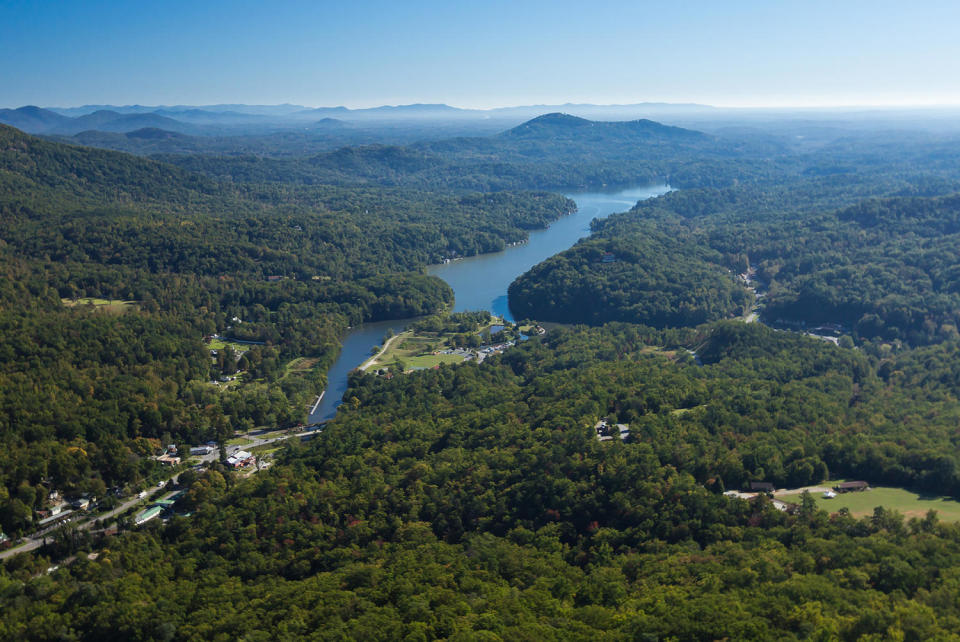The Lake Lure Dam in western North Carolina overflowed Friday after Hurricane Helene swamped the area, forcing evacuations and warnings from officials that the dam could fail.
Warnings about a second possible dam failure in the state — the Walters Dam, less than 100 miles from Lake Lure — also raised concerns in nearby Newport, Tennessee, as residents were asked to evacuate.
The Lake Lure Dam, located about 25 miles east of Asheville, remains at high risk of failure and could flood downstream communities if it does. Officials in South Carolina were warned that a failure could even affect cities there, according to the North Carolina Department of Environmental Quality.
“RESIDENTS BELOW THE LAKE LURE DAM MUST EVACUATE TO HIGH GROUND IMMEDIATELY!!” the Rutherford County Emergency Management Department wrote in a Facebook post around 11 a.m. ET on Friday. “DAM-FAILURE IMMINENT!!”
As of 1:30 p.m., water was above the dam, the emergency management agency said.
“Structural support has been compromised, but the Dam Wall is currently holding,” the agency wrote on Facebook. “Emergency staff are working with the constructors and going from house to house to ensure all citizens have been evacuated.”
The 100-foot hydroelectric dam, located on the Broad River about 25 miles from Asheville, is operated by the city of Lake Lure, according to the National Inventory of Dams. The maximum storage capacity is 44,914 hectares, approximately equal to the volume of water in 22,500 Olympic swimming pools.

Olivia Stewman, the city manager of Lake Lure, said water was flowing around the dam on one side. Complicating the emergency response, she added, were blocked roads and fallen trees throughout the area.
“Our dam engineer is on his way here. As soon as he can get here, he’s going to do a site survey to determine conditions,” Stewman said. “Right now, our first responders and public safety agencies are doing the best they can.”
The North Carolina Department of Environmental Quality said on its website Friday morning that the 450-foot-long dam was eroding on one side. An update posted earlier in the day said dam operators had lost power but were able to manually operate the locks.
Southern Appalachia has been underwater for several days after a preliminary storm brought rainfall in some areas that would only be expected once every thousand years. The remnants of Hurricane Helene then struck overnight and Friday morning.
Jared Klein, a meteorologist with the National Weather Service, said the area near Lake Lure has been pummeled by extreme rainfall over the past three days.
“You’re looking at 8 to 18 inches of rain in the lake area,” Klein said.
Lake Lure is considered a “major” hazard dam according to the National Inventory of Dams – a classification that means failure or misuse is likely to result in loss of life. According to the inventory, the dam was in ‘fair’ condition during an inspection in March 2023.
The city of Lake Lure is trying to replace the aging dam. As of June 2023, it had received at least four grants from the Federal Emergency Management Agency intended to help rehabilitate or replace high-hazard dams. It also received $16.5 million for the project in 2022 from the state of North Carolina.
Earlier this year, the lake’s water level was lowered to replace important infrastructure, according to the city’s website. Over the summer, contractors worked on a project to install a reservoir drain, described as an “emergency preparedness feature” that would allow the lake to be lowered before a storm.
Meanwhile, confusion reigned in Newport, Tennessee, on Friday after local officials announced that the Walters Dam – also known as the Waterville Dam – had “suffered a catastrophic failure.”
However, Kristin Coulter, communications director for the Tennessee Emergency Management Agency, said later in the day that it was a false alarm but that the city of Newport was still at risk.
“It’s not failing,” Coulter said. “Officials have asked residents to evacuate.”
Flow data from the United States Geological Survey showed that the Pigeon River was experiencing major flooding downstream of the dam.
Valerie Patterson, a spokeswoman for Duke Energy, said the dam and locks were functioning “as expected” and that the company “has all gates open at the Waterville Dam and continues to flow water through the dam.”
The false statements about the dam failure appeared to come from Cocke County Mayor Rob Mathis, who later declared a state of emergency for the county, according to a Facebook post. The Tennessee Emergency Management Agency shared Mathis’ warning.
Overall, America’s dams – more than 92,000 in total – are aging and many are in need of costly restoration. Few dams are designed for today’s climate, with a warmer atmosphere that can hold and deliver more intense rain. Meanwhile, more people have moved to the flood areas below these dams.
In a report last year, the Association of State Dam Safety Officials estimated it would cost $157.5 billion to bring non-federal U.S. dams up to standard.
From 2013 to 2023, 283 dams in the U.S. experienced some kind of failure, according to data from the Association of State Dam Safety Officials and analyzed this summer by NBC News. Most dam failures ultimately do not cause public safety concerns, but in 2019 a dam failure in Nebraska drowned a man whose home was washed away.
This article was originally published on NBCNews.com







